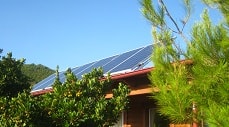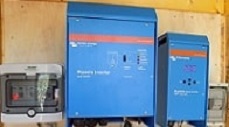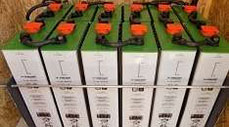FAQ for Off-Grid Solar Systems
Which off-grid solar package should I choose?
If you are not experienced with off-grid solar systems, call us to ask the right questions and suggest the off-grid solar system that suits your case. Off-grid solar systems require specialization and experience to make the right choice, otherwise, the result will not be as desired.
What kind of batteries should I choose for my off-grid solar system? Lead-acid or lithium?
The answer is not one-dimensional. It depends on the use of the house (if it is a permanent residence, lithium is preferred), the temperature of the installation area (if the temperature frequently drops below freezing, lithium is not recommended), the available budget (even in 2024, lithium is still much more expensive), the available space (lithium batteries are lighter and take up less space), and many other factors that an experienced engineer in off-grid solar systems will explain to you. You can find more answers at the dedicated page for off-grid solar batteries.
Which solar panels should I choose, the large 600-watt ones or the smaller 400-watt ones?
The efficiency of solar panels in terms of area is the same whether they are 650 watts or 450 watts. The 650-watt panels are just much larger in size. Since off-grid solar systems are for homes, smaller panels (with the same efficiency) are preferred, mainly for reasons of durability against snow, hail, and wind.
What should I pay attention to when buying an off-grid solar system?
The most important thing is the company you will work with. Prefer a company that has been in the field for many years and has experience, as off-grid solar systems have several special characteristics. Choose branded equipment and panels from companies that have been around for years and honor their warranties. Clearly describe your needs to the engineering consultant as well as future extension requirements. Prefer separate inverters and chargers (rather than all-in-one systems, which often have frequent failures). Allocate a little extra budget for the battery (either by increasing its size or upgrading its quality); you will benefit from longevity and system stability. Of course, you don't need to worry about any of the above if you work with an experienced company in off-grid solar systems like MP-Energy.
Are off-grid solar systems legal?
Yes, off-grid solar systems are legal. These systems generate energy that powers loads within the internal electrical installation of a building, without feeding electricity back into the grid.
When is an off-grid solar system cost-effective?
First of all, when there is no electricity in a house, the off-grid solar system is the optimal choice. Additionally, when our consumption is higher in the summer than in the winter and during the day compared to the night, smaller batteries are typically selected, and the off-grid solar system pays off quickly.
When is an off-grid solar system not cost-effective?
If your consumption is much higher in the winter than in the summer, the off-grid system that will cover it will generate much more energy in the summer, which will go to waste. This usually happens when we heat our home using electricity or when we have permanent loads (e.g., servers in both summer and winter). For example, a house with a heat pump and a daily winter consumption of 30 kWh will need more than 30 panels of 450 watts just for heating. These panels will produce 30 kWh per day in winter but up to 80 kWh per day in the summer, while the house may only need 20 kWh, as the heat pump won't be running in the summer.
How many years will the batteries of my off-grid solar system last?
This answer cannot be one-dimensional. Beyond the obvious fact that it depends on the type of batteries, there are many reasons that determine the lifespan of the batteries in an off-grid solar system. In summary, the lifespan of the batteries depends on their type. If the batteries are 12-volt lead-acid, they usually have 1000-1200 cycles at 50% depth of discharge. If the batteries are 2-volt lead-acid, we get 2500-3000 cycles at 50%, while if they are lithium, we get 4500-6000 cycles at 80-95% depth of discharge, depending on the quality of the cells. Additionally, how the system is used plays a significant role. For example, a 12-volt battery may last 8 years in a summer home and only 2 years in a permanent residence. Therefore, the choice of battery type also depends on the use of the house. Finally, the user's behavior plays a crucial role: the same 2-volt battery can last 10 years with a careful user (not discharging below 50%, not using heavy loads when there's no sunlight, etc.) and 6 years with a careless user (e.g., forgetting to top up the liquids in an open-type battery, leaving a fridge plugged in all winter if it's a summer home, etc.). Let's not forget the proper configuration of charging parameters by the installation technician, which is essential.
Why do I see such large price differences for off-grid solar systems from one company to another?
The answer is obvious, and everyone knows it. Not all qualities are the same. The inverter from Victron will not last as long as a Chinese multi-device, which is why it costs three times more. The same goes for batteries and panels. Additionally, the cost includes support and warranties, which are crucial and should be respected by your supplier.
Is it true that off-grid solar systems have frequent failures?
The prevailing opinion that off-grid solar systems are unreliable comes from incorrect choices of materials and design made by untrained and inexperienced personnel in the past decade. Off-grid solar systems, when properly designed and constructed with the right materials, can function safely and reliably for many years.
Can I fully rely on an off-grid solar system for my electricity needs?
Of course! As long as you don't limit the project budget. Everything is a matter of cost, and that is why an experienced designer-engineer will show you the limits of the proposed system, and you can choose to either increase it further or supplement it with a secondary power source (e.g., a generator) depending on your budget.
When should I choose to add a wind turbine?
A wind turbine can be helpful primarily in areas with high wind potential (islands, Evia, Crete, Attica) and when there is usage in the winter or at night. If the usage is seasonal or during the day, then adding solar panels is preferred because they have a lower cost for the same energy (a 250W panel costs €250 and produces 1kWh, while a 200W wind turbine produces the same energy but costs 4 times more with the tower included). And let's not forget, in Greece, the only sure thing is the sun!
Which type of batteries should I choose, open or closed type?
Depending on the application, the designer can choose between open or closed-type batteries for solar systems. Closed-type batteries (AGM, VRLA, GEL) are typically chosen when installed in moving constructions (boats, caravans) or in poorly ventilated spaces where people reside. Open-type batteries, compared to closed-type ones, require maintenance (periodic fluid level checks), but for the same cost, they offer higher stored energy for more charge-discharge cycles and better resistance to deep discharges. It's also critical to compare batteries based on the same discharge rate (e.g., C10, which is realistic for solar systems).
Which charge controller should I choose?
Without a doubt, choosing an MPPT (Maximum Power Point Tracking) charge controller is the best option because it delivers nearly 30% more power than a basic PWM controller, while also helping the batteries achieve their maximum lifespan (good charge controllers automatically perform balancing processes for open-type batteries).
What should I consider when choosing an inverter?
The inverter is the part of the off-grid system that operates most hours and is most likely to fail earlier. Therefore, the reliability of the inverter is crucial and will save you from unexpected blackouts and the need to purchase new equipment. The primary concern is selecting a pure sine wave inverter (modified sine wave inverters may cause damage to sensitive devices and reduce the lifespan of other devices). Also, it's important that the efficiency is above 95%, and the actual continuous power output at temperatures above 25°C does not differ significantly from the nominal rating (low-quality inverters often lose more than 20% of their power at 35°C!). Finally, it’s a good idea for the inverter to also be a charger, in case we need to charge the batteries with a generator.
How important is adding a generator?
In cases where uninterrupted power supply is critical (e.g., power without the grid), adding a generator is recommended in case of extended cloud cover or calm weather. (Additionally, cost limitations have reduced autonomy to a few days.)
Should I choose AC or DC connection?
Depending on the system size, the engineer you work with will advise whether an AC or DC connection is required. For systems with solar power and inverters under 5kWp, a DC connection is recommended, while for larger systems, especially three-phase ones, an AC connection is preferred.
What should I consider to ensure my off-grid solar system is expandable?
Two issues may arise when expanding an off-grid solar system. First, the charge controller, which can be easily replaced at a low cost. Second, the inverter, which, if selected for low voltage, will become obsolete if we want to increase the battery voltage, but mainly, it should have the ability to parallel for power expansion.
When should I choose to install an off-grid solar system?
The installation of an off-grid solar system is necessary in the following cases:
i) Buildings where the public grid is far (and consequently expensive),
ii) Illegal buildings,
iii) Incomplete buildings that do not have the necessary permits and cannot be electrified,
iv) Holiday homes with primarily seasonal use and small energy demands,
v) Areas with frequent power outages,
vi) Buildings that require continuous operation (e.g., butcher shops in Santorini, ice cream shops in Northern Evia, etc.),
vii) Houses where we want to ensure the operation of basic loads (fridges, lighting, TV) even "in wartime" or similar situations.
Is remote monitoring necessary for my off-grid solar system?
Being able to view or, ideally, control the operation of an off-grid solar system remotely is a great advantage. Telemetry for off-grid solar systems is very helpful, especially for large and demanding systems.
In which cases is an off-grid solar system not advisable?
Installing an off-grid solar system becomes a complex issue when it comes to fully autonomous houses or commercial spaces with large loads and there is a strict cost limitation.
Can I install the off-grid system myself?
Installing an off-grid solar system involves many risks! Apart from the potential destruction of equipment caused by incorrect polarity connections, the installer’s life and physical safety are at risk in many situations. The voltage of the solar panels often exceeds 100V, and there is no way to interrupt them, except by covering them with black fabric. When connecting the batteries, dangerous arcs can form, and an incorrect move causing a short circuit (e.g., with a wrench during terminal tightening) could lead to an explosion, with at least loss of vision due to electrolyte leakage. Therefore, installation should only be performed by specialized personnel!
For any further information concerning off-grid solar systems do not hesitate to contact us to: +302103217895.



Περισσότερες πληροφορίες για FAQ for Off-Grid Solar Systems
Καλέστε μας στο 210 3217895 ώστε να σας αποδείξουμε ότι υπάρχουν άλλοι 100 λόγοι για να μας επιλέξετε.
